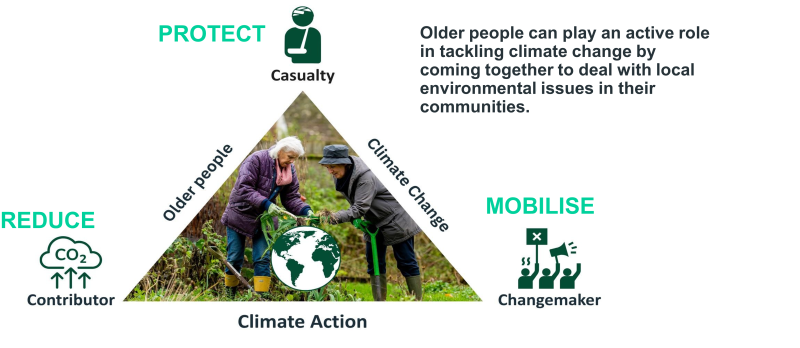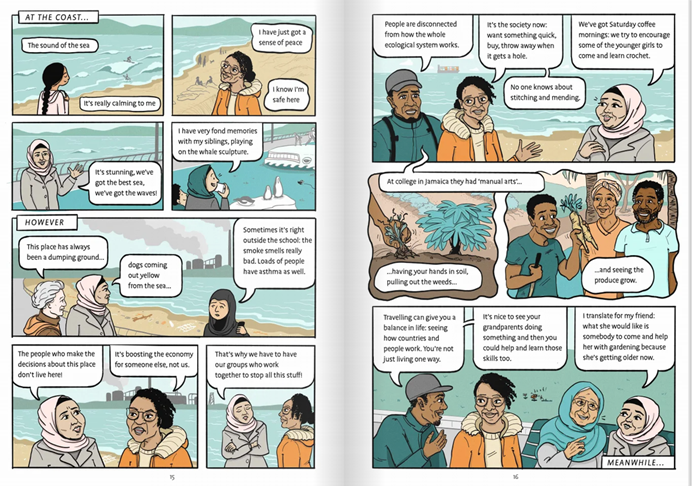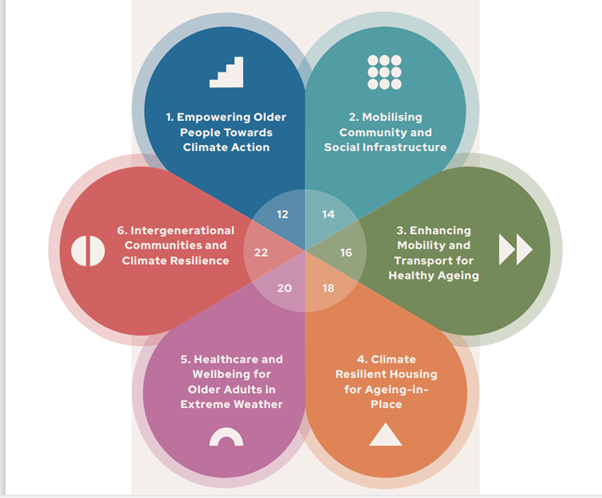Joanna Watson11 Jul 2025
Not too old. Never too late. As an older member of Friends of the Earth staff, I was intrigued by this framing and the panel discussion we recently held to address the challenges and benefits that an ageing population presents to environmental and social movements. How will climate change affect older people? What role might older generations play in shaping a fairer, greener future? How will we balance the need to fund a sustainability transition against the health and care needs of an older population?
Friends of the Earth recently took a deep dive into the data and research to explore the implications of the impact of this trend on our mission. We described some of our conclusions in a previous article and following our exploration, we held a webinar with the Stockholm Environment Institute (SEI) at York University to explore these issues, as part of the London Climate Action Week. This is what we heard.
Reduce, Protect, Mobilise.
By way of introduction, Gary Haq from the SEI at York helpfully described 3 ways of looking at the role of older people:
Reduce – taking responsibility for their CO2 emissions and finding ways of reducing their carbon footprint.
Protect - as ageing makes people more vulnerable to the direct impacts of climate change, policymakers have to address access to health, care and transportation. Heat and pollution both exacerbate dementia which underscores the need for age-sensitive climate strategies.
Mobilise – older people can be changemakers, building on their role in the community and on skills and experience, which is important for building local resilience.
Looking through different lenses, we explored climate action by older people in the community; intergenerational and dementia-friendly climate action; and healthy ageing and place-based climate practice. We heard about what older people want and need in taking action together and with lots of synergy in the various approaches, we identified some important factors to bear in mind.
10 tips to make climate action more age-inclusive
- In order to play an effective role, older people need to be in the room from the start and not have programmes or solutions imposed upon them. Collaboration and co-creation are key.
- Be flexible and adaptable and engage with people in the right spaces for them, such as community centres, residential homes, churches or mosques, social clubs, cafes or pubs, activity groups and garden centres.
- Recognise diversity – people of 60+ are not a homogenous group and the ways to connect with them will involve different channels, places and approaches. What climate action they can take will depend on different factors; not least on whether they are rural, coastal or urban-based and how digitally literate they are.
- Listen to what older people have to say – include them as equal partners in the conversation.
- Building relationships and connection are more important than getting the infrastructure right (it’s where resilience starts).
- Involve older people in monitoring and evaluating local climate risk and in designing solutions/taking action. This could involve surveys, carbon counting or citizen science, but also input to local authority consultations, talks, letter-writing and social media posts.
- Be aspirational in creating goals but make sure that steps along the way are feasible and achievable, to keep people engaged and motivated by small successes.
- Use lived experience, storytelling and relevant research to help raise awareness and shift attitudes – especially in citing examples, both locally and further afield to encourage older people to engage in climate conversations. For example, a Somali elder shared stories about flooding in Mogadishu to stimulate thinking in the Bristol Old People’s Forum about flood resilience.
- Bring elders and children together in playful and creative activities around climate as a way of developing conversations in the community and to overcome a tendency to see intergenerational relationships as a barrier. The Climate Comic is a delightfully accessible way of capturing discussions held in workshops, which can then be used as a tool to initiate further conversations with different groups.
- Find out what support people need (for example some older people are not online and may prefer face-to-face conversation).
Is age a barrier to taking effective climate action?
Speakers stressed the importance of building community cohesion and promoting intergenerational connections. While we recognised there can be a perception of intergenerational conflict (who’s responsible for climate change? Who has inherited the legacy of climate impacts?), this was not generally the experience of this panel.
We agreed there is a difference between age-inclusive and intergenerational climate action. Activities need to involve older people but intergenerational activity is intentional and needs to be designed to engage both. It’s about collaboration – it’s very important to find the common ground and avoid the ‘boomer v millennial’ framing.
We recognised that there is enormous value in sharing resources and learning but it must flow both ways. It’s not old people telling youngsters what to do but both sharing stories, experiences and insights. Face-to-face makes all the difference (when kids told the stories they heard from a care home visit to other school kids, they included these stories in their subsequent storytelling. The other classmates didn’t).
A great example of this kind of collaboration is the Climate Comic, designed to kickstart conversations between generations, to build empathy and to work together to address the climate and nature emergencies.
Shifting the narrative
All too often in conversations around climate action, old people are seen as victims or casualties of climate impacts. Just as 60+ is not a homogenous group, older people have hugely differing life experience, physical abilities and professional skills. Not bringing such a wealth of experience on board can hamper community cohesion and not enough is being done to embed age-related perspectives in existing age-friendly, climate-resilient practices locally.
Older people want to make a difference at a practical level to the transition, challenge the ageist narrative, link local to the bigger picture, and influence policy and decision-making.
Perhaps the most important insight in the discussion is the recognition that while an age-friendly agenda and effective climate policies do exist, there's a lack of imaginative cross-over and they're not currently being properly integrated.
Practical things to promote age-inclusivity.
- Activity-centred empowerment that is participatory and co-designed, including storytelling, art, nature walks etc
- Bridging the knowledge-action gap- promoting carbon literacy, digital resilience, accessible climate advocacy. Create resilient hubs to provide trusted spaces, especially for intergenerational learning and sharing.
- Embed climate positive behaviours in everyday routines that also promote a healthy lifestyle such as active travel
So what’s next?
This is very much the start of a conversation, harnessing current research and experience and looking to identify the key challenges. To us, the biggest question is how could this thinking shift from small demonstration projects into something more systemic? What funding or policy changes could drive this? What opportunities are there to reflect the good practice we’ve identified – for instance, how could the voices of older people help shape the government’s planned Public Participation in Net Zero strategy?
If you’re interested and have insights in the connection between climate action and an ageing population, we’d love to explore this further. Please get in touch.
For more about the panel members and their projects:
Panel Members
Gary Haq, Stockholm Environment Institute at the University of York, UK
Healthy Ageing and Place-Based Climate Practice
Ryan Woolrych, Heriot-Watt University, UK
During 2022-23, the Urban Institute at Heriot-Watt University, together with the Stockholm Environment Institute at the University of York, undertook a research project across the UK which aimed to explore the challenges and opportunities of extreme weather and climate change on ageing populations. The report identifies recommendations for creating age-friendly and climate resilient cities and communities, including empowering older people towards taking climate action.
Older People Community Climate Action
Ian Quaife, Bristol Older People’s Forum, UK
BOPF is a membership organisation entirely led by older people with the aim of every older person in the city to be an equal, valued and participating member of the community, able to influence policy and decision-making…with a focus on local neighbourhoods, housing and public transport.
Co-Creating Intergenerational Climate Action
Merryn Thomas, University of Exeter, UK
Merryn talked about The Climate Comic, a collaboration between south Wales communities, researchers, an advisory group and illustrator Laura Sorvala. The project seeks to understand older and younger people’s climate change perceptions, imaginaries and behaviours in the places that matter to them. The Climate Comic is part of the ‘Understanding Older and younger people’s PerspecTives and Imaginaries of Climate change’ (OPTIC) project at Swansea University.
Dementia-Friendly, Age-Inclusive Climate Action
Graham Galloway, Meeting Centres Scotland, UK and Louise Wilson, Outside the Box, UK
Meeting Centres are social clubs which offer on-going warm and friendly expert support to people with mild to moderate dementia and their families. Originally developed in the Netherlands, Meeting Centres are now growing around the world. They help people to adjust to living with the symptoms and changes that dementia brings.




